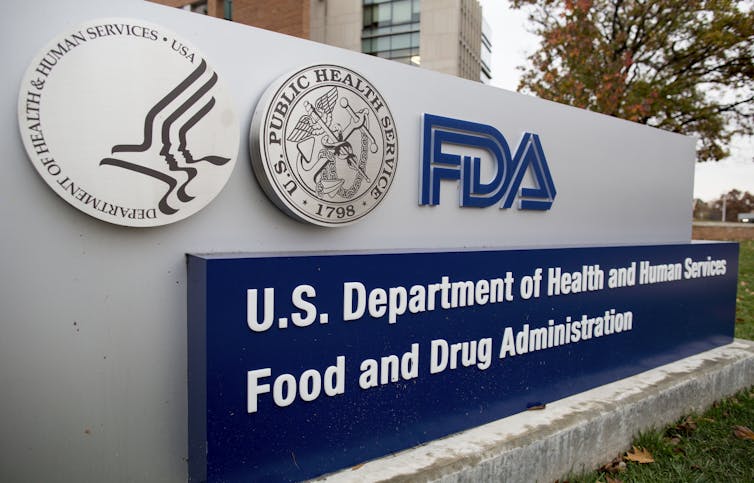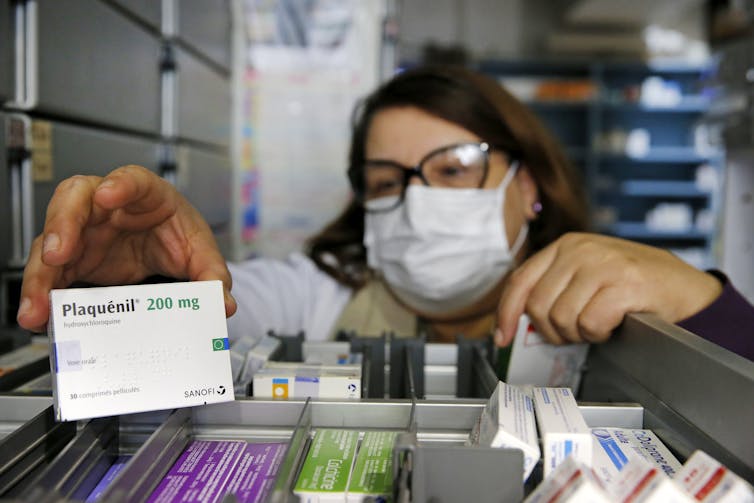In the rush to innovate for COVID-19 drugs, sound science is still essential
- Written by Christopher Robertson, Professor of Law, University of Arizona
Hydroxychloroquine and chloroquine[1] have been at the center of debate in recent weeks over which drugs should be used to treat COVID-19. Neither product has strong evidence to support use for this purpose, and small studies reported to date have either had significant flaws or failed to demonstrate effect.
Nonetheless, the president can’t seem to stop pushing them[2], arguing that patients have nothing to lose. As physicians, bioethicists and drug law experts, we have a responsibility to inject caution here. As public officials and scientists rush to innovate, no one should overlook the critical role of strong regulatory protections in supporting our ability to actually figure out which drugs work against COVID-19. Weakening commitment to science and evidence during this crisis truly would be “a cure worse[3]” than the disease.
 The FDA is on the lookout for fraudulent products that claim to cure COVID-19.
Getty Images / Al Drago / CQ Roll Call[4]
The FDA is on the lookout for fraudulent products that claim to cure COVID-19.
Getty Images / Al Drago / CQ Roll Call[4]
FDA’s emergency use authorization
There are no Food and Drug Administration-approved drugs to treat COVID-19, and no product has strong data to support its use against this disease. Nonetheless, on March 28, the FDA issued an emergency use authorization[5] (EUA) for certain hydroxychloroquine sulfate and chloroquine phosphate products donated to the strategic national stockpile by various pharmaceutical companies. The EUA was granted exclusively to the Biomedical Advanced Research and Development Authority (BARDA), allowing it to distribute these stockpiled drugs to local public health authorities for the unapproved use of treating hospitalized COVID-19 patients unable to participate in clinical trials.
An EUA[6] is not the same as the FDA’s traditional marketing approval. To be approved under normal rules, drugs must be shown safe and effective for their intended use. An EUA, in contrast, is a temporary authorization granted in the face of a public health emergency, based only on a determination that a product “may” be effective and that its likely benefits outweigh its likely risks. This EUA was supported only by “limited in-vitro and anecdotal clinical data in case series” – with no acknowledgment of contrary data or significant safety concerns[7]. Overall, it’s sown even further confusion about the promise and uncertainties of these drugs.
Off-label use
An EUA is not the only way[8] that COVID-19 patients may access hydroxychloroquine and chloroquine. A physician is generally free to prescribe approved drugs for unapproved uses as part of their authority to practice medicine. This is referred to as “off-label” use. Because several hydroxychloroquine and chloroquine products have been FDA-approved for malaria, lupus and rheumatoid arthritis, they’re eligible for off-label use against COVID-19.
Following President Trump’s comments that these drugs could be a potential “game changer[9],” attention and prescriptions sky-rocketed, despite caution from experts. Some physicians stockpiled the drugs for personal use[10], and several hospitals have adopted hydroxychloroquine as COVID-19 standard of care. Although there have been efforts to help protect supply for those patients needing the drug for their proven indications, some of these patients have been told they may have to go without[11].
It is too soon to say[12] whether chloroquine products work for COVID-19, since the few clinical studies[13] are small and lack randomization or carefully matched control groups. Severe side effects have caused some hospitals[14] to stop using them altogether.
There is a great need for rigorously conducted clinical trials on these products and their possible effectiveness in fighting COVID-19. But if physicians continue prescribing them off-label, without regard for appropriate testing, we’ll be left with anecdotes, not evidence.
 A box of hydroxychloroquine, marketed under the name of Plaquenil, in a Paris pharmacy.
Getty Images / Chesnot[15]
A box of hydroxychloroquine, marketed under the name of Plaquenil, in a Paris pharmacy.
Getty Images / Chesnot[15]
Expanded access to new drugs
There are other drugs with some potential to combat COVID-19, but that have not yet been approved for any use and therefore may not be prescribed off-label. These drugs are currently under investigation in clinical trials around the U.S. and the globe. For seriously ill patients, the FDA has a pathway[16] known as “expanded access” (sometimes called “compassionate use”) by which patients may be dosed with unapproved drugs for treatment use, if they are unable to enroll in a clinical trial. This eligibility restriction is critical because it ensures that patients cannot secure access by opting out of the trials designed to produce the evidence needed to confidently assess a product’s safety and efficacy.
Drug maker Gilead has emphasized this approach with its investigational antiviral drug remdesivir. Even as it opens its expanded access program[17] through a wider pathway, the company has explained[18] that participation in clinical trials will be the primary mode of patient access.
Focus on science
Pragmatism is needed to collect data in real time, as patients are also in desperate need of treatment. That’s precisely the approach taken by the World Health Organization in its mega trial[19] of four potential treatments for COVID-19, including remdesivir and chloroquine products, with over 70 countries participating. The trial is aptly named SOLIDARITY, and it is designed to minimize the burden on physicians and patients, while allowing random assignment and collection of systematic, anonymous data.
We simply have to stop guessing about what’s going to work for patients battling COVID-19. Patients today and tomorrow need a commitment from politicians, policymakers, companies and physicians to prioritize science and rigorous study[20]. Off-label use and expanded access may be reasonable options for patients when there is no clinical trial available, but if there is, we have to prioritize enrollment.
The FDA has demonstrated its willingness to help speed trials and facilitate the collection of data. But its regulatory standards must not be short-circuited and its flexibility must be used judiciously. Federal policy in this area should be driven by scientific expertise, not false hope, hunches or short-sighted political demands.
[Get facts about coronavirus and the latest research. Sign up for The Conversation’s newsletter.[21]]
References
- ^ Hydroxychloroquine and chloroquine (www.statnews.com)
- ^ pushing them (www.nytimes.com)
- ^ a cure worse (twitter.com)
- ^ Getty Images / Al Drago / CQ Roll Call (www.gettyimages.com)
- ^ emergency use authorization (www.fda.gov)
- ^ EUA (www.fda.gov)
- ^ significant safety concerns (jamanetwork.com)
- ^ not the only way (www.youtube.com)
- ^ game changer (abcnews.go.com)
- ^ stockpiled the drugs for personal use (www.nytimes.com)
- ^ go without (www.buzzfeednews.com)
- ^ too soon to say (annals.org)
- ^ few clinical studies (annals.org)
- ^ some hospitals (www.newsweek.com)
- ^ Getty Images / Chesnot (www.gettyimages.com)
- ^ a pathway (www.fda.gov)
- ^ expanded access program (www.gilead.com)
- ^ has explained (www.gilead.com)
- ^ mega trial (www.who.int)
- ^ rigorous study (jamanetwork.com)
- ^ Sign up for The Conversation’s newsletter. (theconversation.com)
Authors: Christopher Robertson, Professor of Law, University of Arizona

